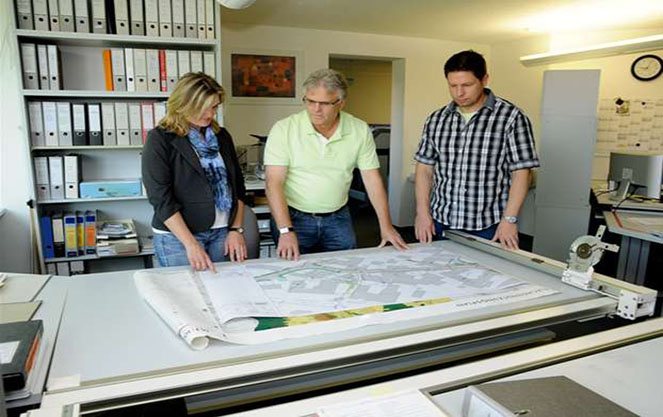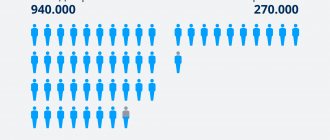Germany, one of the most developed countries in the world with a powerful economy, is very popular among those who are looking for opportunities for self-realization and strive to build a successful career. Today, one of the most effective ways to achieve these goals is labor immigration. Let's try to figure out what the most popular professions in Germany are in 2021 and what kind of salary you can expect in this country.
What are the chances of finding a job in Germany?
If you decide to work in Germany, you need to consider some important points. It’s worth noting right away that competition in the country is quite high, so in order to find a good position, you need to be a true professional and prove your competence.
An important factor influencing the results of a job search is the availability of an education diploma, which must meet German standards. Please be aware that if you are employed, you may be required to undergo additional training and pass an appropriate exam.
Another point that is of great importance when looking for a job is language.
Your chances of getting a good position will increase many times over if you speak German or English.
In general, Germany is a fairly prosperous state, and, despite the flow of refugees, which is increasing every year, and the general decline in the world economy, unemployment in Germany is not growing, but, on the contrary, is decreasing.
The most in demand in the labor market are specialists with higher education: 88% of such specialists work for the benefit of the country. Employers need slightly less employees with secondary education - only 46% of them are employed. But for people, especially young people who do not have a professional education, it is quite difficult to find work.
In-demand professions in Germany for Russians
Despite all the stability of the development of the German economy, the field of education and the presence of favorable conditions for existence in the Federal Republic of Germany, there is a catastrophic shortage of workers. The country especially needs highly qualified professionals with diplomas from higher educational institutions. The most in-demand professions in Germany are those related to the banking and IT fields:
- investment consultants;
- bank employees;
- programmers and developers.
Germany also needs representatives from the fields of medicine, law, chemical industry, aviation, construction and architecture. The list of in-demand professions of this kind includes:
- dentists, anesthesiologists, plastic surgeons, neurologists, gynecologists, obstetricians (in principle, junior medical personnel are also needed);
- civil engineers, mechanical engineers, power engineers;
- teachers of colleges and universities;
- representatives of the telecommunications and media fields;
- top managers in the strategy area;
- financiers and accountants;
- specialists in the hotel and restaurant business.
When hiring for jobs in the listed professions, German employers require an education diploma. In German companies, workers with two higher education degrees are in high demand. Such citizens are often provided with increased wages.
What professions are in demand?
If you want to study in Germany, but have not yet chosen a specialty, or you already have a diploma and want to find a prestigious job, we offer a list of the most popular professions:
- doctors;
- engineers;
- IT specialists;
- lawyers;
- economists.
Let's take a closer look at these specialties and their advantages.
Doctors
The work of medical workers in Germany is the highest paid. Every year more and more foreigners seek to get a job in a good German clinic. One of the main conditions for this is having a diploma of complete higher medical education, completing an internship or residency. Another prerequisite for foreigners is knowledge of the German language. Moreover, its level should not be lower than B2.
A doctor’s salary depends on specialization, work experience, location of the clinic and other factors. On average it ranges from 3,000 to 8,000 euros per month.
Shifts and work beyond the norm are paid separately - approximately 160-300 euros per day, depending on the specific medical institution.

There are 35 public and 4 private medical universities in Germany. You can go there and get an education by completing 2-3 years of university in your home country. At the same time, you must have a good command of the German language and submit a package of documents with a reasoned motivation letter, biography and an extract of grades from the university where you studied.
You can look for a job on your own or with the help of recruiting agencies. There are several sites for independent search: meinestadt.de, jobomat.de, meinestadt.de and others. In addition, you can go to the website of any clinic and see the list of available vacancies.
Engineers
Engineer jobs in Germany are highly valued and the working conditions are some of the best. There are currently 25,000 vacancies on the German labor market for mechanical and automotive engineers and more than 13,000 vacancies for energy and electrical engineers. Moreover, every year the demand for representatives of this profession is growing.
The salary of young engineers in the first years ranges from 35,000 - 45,000 euros per year, the salary of experienced specialists reaches 50,000 - 70,000 euros per year. When applying for employment, engineering diplomas obtained outside of Germany must be checked for compliance with German equivalents.

You can start your job search on your own by leaving your resume on the exchange: monster.de, absolventa.de, jobleads.de. If you already have a company in mind, you can go to its official website and see the vacancies offered.
German universities train specialists not only in classical engineering fields (mechanical engineer, electrical engineer, civil engineer), but also in many interdisciplinary professions. It should be noted that engineering is the third largest specialty in German universities.
An important feature of the German higher education system is that education for foreign students is free.
In addition, they receive the right to earn extra money in parallel with their studies. At the same time, a prerequisite for free training is knowledge of the German language - applicants must have a DSH certificate.
IT specialists
The profession of a programmer in Germany is considered to be in short supply. German companies offer favorable working conditions and attractive salaries for software developers (43,000 - 57,000 euros), IT consultants (40,000 - 63,000 euros), database and network administration specialists (30,000 - 47,000 euros), SAP/ ERP consultants and programmers (40,000 – 67,000 euros).
The salary depends on several factors: education, skills and work experience, place of employment. The most profitable in terms of wages are considered to be federal states such as Hamburg, Hesse, Baden-Württemberg, Bavaria, and North Rhine-Westphalia.
The easiest way to look for a job is via the Internet by submitting your resume through the Europass system. It should be accompanied by certificates, a letter of motivation, and a translation of the diploma.
The Germans are quite meticulous about all the little things, so pay attention to the correctness of the documents. If the head of the company likes your resume, they will contact you for a further interview.

Excellent knowledge in the field of computer science, electronic engineering and programming can be obtained at the Technical University of Munich, which is considered one of the best in Europe.
After studying for 2 years at a domestic university, you can continue to receive education in your chosen specialty at this university. This requires knowledge of the German language and passing the DSH exam.
Other popular specialties in Germany
For those who would like to obtain a position as a lawyer in Germany, there are two ways: to become a participant in an exchange program or to obtain a full-fledged higher legal education at one of the German universities. The second option is suitable for those who are going to work directly in Germany. However, you will not be allowed to work as a judge or notary even with a German diploma, since only persons with German citizenship are hired for these positions.
The business sector, as well as law firms, are in great need of competent legal experts, so you can try yourself in this direction. A lawyer's salary can reach 100,000 euros per year, but it all depends on the company.
The work of an economist and accountant is associated with great responsibility, and many German companies need precisely such specialists and are ready to pay them adequately for their work. For example, the annual salary of an economist in Germany reaches 65,000 euros. So the employment chances for representatives of these professions look good.
Some of the best universities for obtaining economic education are the University of Cologne, which annually takes leading positions in world rankings, and the University of Westphalia, the largest in terms of the number of students. It is worth noting that he received the award “For providing support to foreign students.”
What jobs are available for immigrants without knowledge of the language?
Work in Germany for Russians without knowledge of the language is available mainly in the service sector, agriculture, hotel business, construction, and medicine (care for the elderly).
Let's name the 5 most popular professions for men and women:
- general workers (1200–1900 euros per month);
- waiters (660 euros);
- nurse (700–1000 euros);
- cleaning specialists (500 euros);
- builders (1500–2500 euros);
In many large German companies that have branches abroad, knowledge of the German language alone is not enough, since presentations, meetings, and internal documentation are conducted in English.
Examples of such companies: Adidas, Volkswagen and others. Therefore, even if you do not speak German, but know English well, you have every chance of getting a position in a large business corporation.
Salaries in Berlin and major cities
Depending on the location, salaries can vary by almost one and a half times. Residents of the southern regions can boast of the largest earnings; they still receive less in the territory of the former GDR. The difference between the average incomes of residents of Baden-Württemberg and Hesse reaches 1,000 euros (74,030 rubles), between earnings in Hamburg and Vorpommern - 1,221 euros (90,375 rubles), or 32.85%. To be fair, it should be noted that prices there are much higher.
Minimum wage in Berlin and major cities
Until recently, Germany remained the only country in the European Union that did not establish a minimum wage. At first the rate was 8.5 euros (628 rubles) per hour, now the figure has risen to 9.19 euros. The rate is the same for all German states.
Average salary in Berlin and other regions
In the German capital, they earn an average of 3,464 euros per month (256,244 rubles). This is unusual, since in most European capitals salaries exceed the average. Earnings vary quite a lot by profession:
- sellers - 1636 euros (121,025 rubles);
- cooks, waiters - 1,708 euros (126,352 rubles);
- secretaries - 2,500 euros (184,941);
- logisticians - 3,899 euros (287,695 rubles);
- teachers - 4962 euros (367,107 rubles);
- conductors - 5,368 euros (397,083 rubles);
- dentists - 5,382 euros (398,128 rubles).
Berlin dental surgeon is one of the sought-after specialists
The highest average salaries are in Hesse: Frankfurt am Main, the European financial center, is located there. The income level differs from the national average by 114.1%. High salaries in Baden-Württemberg (+108.6% to the national average), Hamburg (105.9%), Bavaria (105.1%), North Rhine-Westphalia (100.8%).
What documents are needed for employment?
To work legally in Germany, you must obtain a work visa. It is issued at the consular section of the German Embassy or at the Consulate General, where you must provide originals and copies of the following documents:
- application in German;
- photos;
- foreign and internal passports;
- diploma of education (translated into German);
- receipt of payment of the duty;
- contract with the employer;
- work permit;
- health insurance.
There is another type of permit that gives the right to work in Germany - the Blue Card. This document is issued subject to certain conditions: the salary in the employment contract must be at least 50,800 euros per year, the provided workplace must correspond to the specialty and a diploma of higher education.
Taxes Germany
Value added tax (VAT) in Berlin
Value added tax is payable whenever you sell goods or list services. The main rate is 19%, and the reduced rate is 7% of the cost of goods or services.
Income tax in Berlin
Individuals and sole proprietors are required to pay income tax. An entrepreneur who has opened a legal entity in Germany faces income tax primarily when paying wages. The company's employee tax is withheld when paying wages and transferred monthly by the company to the tax office.
Trade tax in Berlin
Trade tax is levied on the profits of sole proprietors, partnerships and legal entities. The tax rate depends on the city in which the company is located and ranges from 7 to 15%. At the same time, sole proprietors and partnerships can have profits exempt from trade tax in the amount of 24,500 euros per year.
Corporation tax in Berlin
Corporation tax in Germany is levied on the profits of legal entities. The profits of private entrepreneurs and partnerships are not subject to this tax. The tax rate payable on all profits is 15%.
Capital gains tax in Berlin
Capital gains tax is levied on interest on deposits, on income from securities, as well as on dividends received by participants in companies with authorized capital when distributing profits. The rate of this tax is 25%, plus a 5.5% solidarity surcharge.
Tax paid when purchasing land
The tax is levied on the purchaser of real estate, or a change in the ownership of a company by 95% or more, if the real estate located in Germany is part of the property of that company.
Accounting report in Berlin
Our company works closely with the German tax office, which provides a range of accounting services. With the assistance of our partner tax consultant, we offer a range of services.
Some useful tips for migrant workers
If you intend to go to work in Germany, here are some useful tips to help you:
- take the initiative when looking for work: go to the websites of large companies, pay attention to companies that have branches abroad and are ready to work with foreigners;
- use the services of employment consultants, since writing a competent resume or motivation letter in German is quite difficult;
- create a separate mailbox from which you will send documents (if an email address is specified as a contact), pack and name the files correctly;
- Gather as much information as possible about the company you choose. At the interview, be prepared to answer unusual questions, for example, about your shortcomings, strengths, others’ opinions of you, etc.
If you want to get a prestigious and highly paid job in Germany, you need to constantly improve, from language knowledge to professional skills. Many professions require constant training, so you need to keep up to date with all the latest developments and innovations.
Work for foreigners
In order to take a prestigious position in Berlin, a foreigner needs to speak German at a good conversational level. Without knowledge of the language it will be quite difficult to get a job. Professions such as teacher, driver, waiter, taxi driver and translator are popular among visitors.
The table below contains data on the minimum and average salaries of professions common among foreigners:
| Profession | Min. salary, €/month. | Average salary, €/month. |
| Waiter | 1 600 | 1 815 |
| Driver | 2 200 | 2 500 |
| Translator | 3 635 | 3 892 |
| Educator | 2 575 | 3 015 |
| Taxi driver | 1 890 | 2 064 |
Work in Berlin for Russians
Caregiver
1400 €
We invite you to work at a Russian supermarket in Berlin
1800 €
Sorter
1800 €
Staff required General workers
10 €/hour
We are looking for private security bodyguards for work
2500 €
Working as a doctor in Berlin from the CIS countries
2500 €
Cupcake production worker in Berlin
10 €/hour









